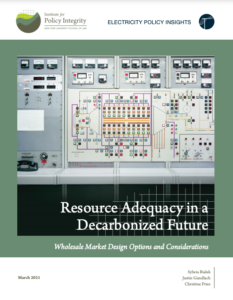Full Title: Resource Adequacy in a Decarbonized Future: Wholesale Market Design Options and Considerations
Author(s): Sylwia Bialek, Justin Gundlach, Christine Pries
Publisher(s): New York University School of Law Institute for Policy Integrity
Publication Date: March 23, 2021
Full Text: Download Resource
Description (excerpt):
This report examines the relationship between resource adequacy and renewable energy. It explores the impacts of renewables on the functioning of resource adequacy mechanisms and how different resource adequacy approaches affect renewable investment. The analysis, informed by the economics, engineering, and policy literature, focuses on two frequently applied resource adequacy approaches: energy-only markets, like the one used in ERCOT; and energy-plus-capacity markets, commonly used in the Northeast (NYISO, ISO-NE, PJM).
The report finds that current approaches to resource adequacy—with certain adjustments—are capable of ensuring that the lights stay on during a future that is powered largely by renewable energy. At the same time, it points out that some approaches embody biases toward fossil-fueled generation, tilting the field against renewables. The report also provides recommendations for market design measures that can support the cost-effective provision of resource adequacy amid continued deployment of renewables.
